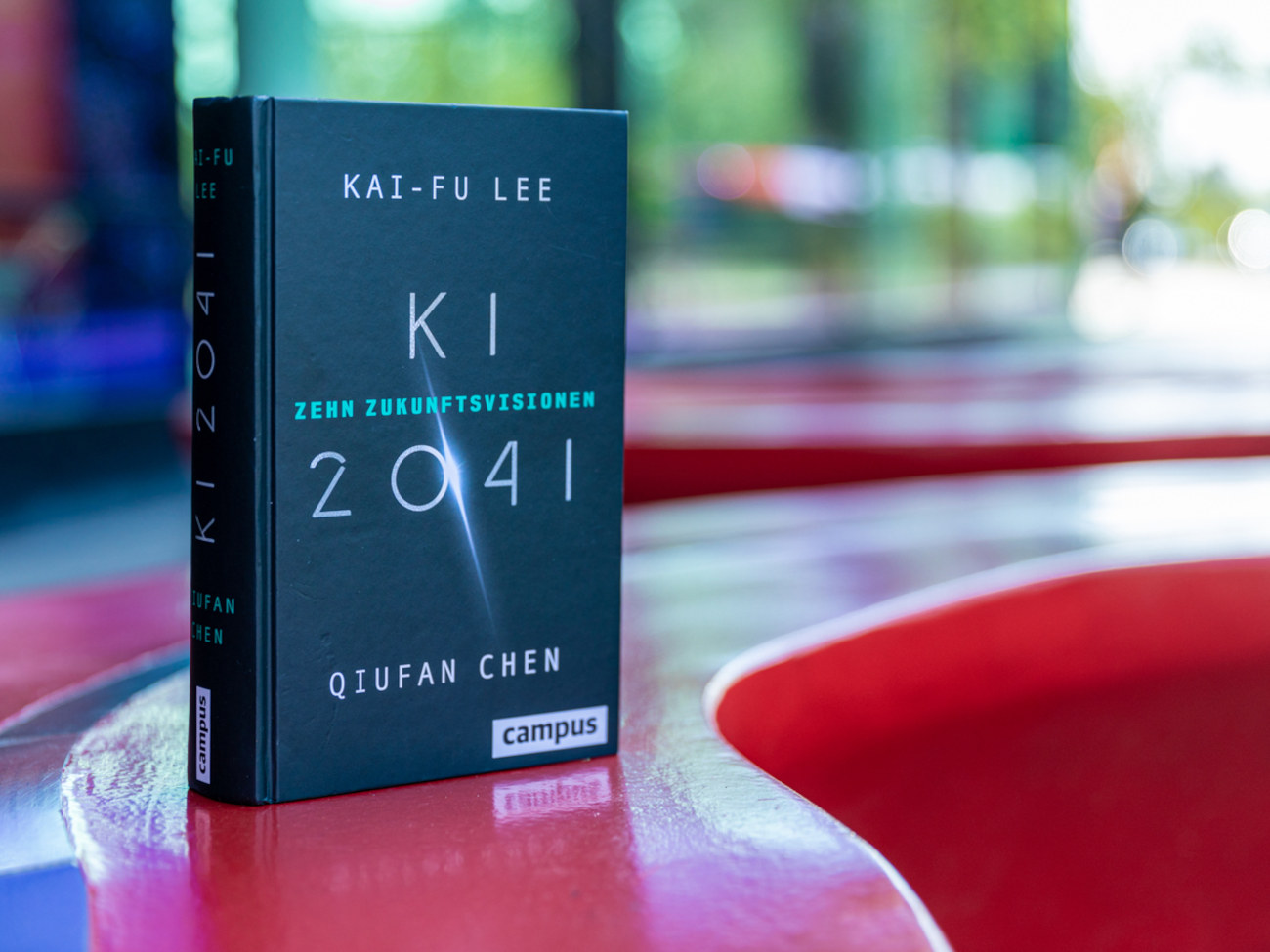
© Matej Meza
Book Corner: “AI 2041 – Ten Visions for Our Future” by Kai-Fu Lee and Qiufan Chen
Rolf Drechsler has an exciting book recommendation
Artificial intelligence will soon play a decisive role in many areas of life. Self-learning software programs already play a major role. In the form of chatbots, digital assistants, and navigation systems, they manage our everyday lives. Computer scientist Rolf Drechsler is deeply involved in AI, machine learning, and data science – and is a passionate science fiction fan in his private life as well. The book he recommends is a mix of fiction and scientific non-fiction.
Rolf Drechsler, professor of computer science, recommends reading AI 2041 – Ten Visions for Our Future by the two Chinese authors Qiufan Chen and Kai-Fu Lee. Chen, Chinese science fiction writer, and Lee, former president of Google China and leading AI expert, collaborated on the book with ten scenarios of the future. The book is about visions and face masks, about low prices for everything and labor shortage, about love and self-driving cars. The year 2041 serves the authors as a point of reference.
“I usually find it difficult to make recommendations,” says Professor Drechsler. “But this book with its short stories is well researched and offers some highly realistic assessments in its analysis. It always scientifically evaluates how probable the respective scenario of the future is. The book is captivating because the stories deal with issues we are currently discussing.”
Poetic Storytelling and Sober Analysis
What makes the book special is its dual structure: It contains literary and scientific texts, poetic narratives, and sober analysis. In most cases, the different genres directly relate to each other – the scientist provides an additional analytical perspective to the fictional narrative. Due to this special feature, the work is neither a reference book nor a novel. This is what makes the book so appealing and broadens its scope beyond the technical. It is for this reason, among others, that it was awarded the German Business Book Prize 2022.
“I enjoy reading novels and fiction in my private life,” says Rolf Drechsler, “because I already have to study a lot of non-fiction for my job. So, for me, reading fiction is extremely inspiring. This book presents some options for the future that are always linked to the question of which scenarios we want. We need to realize:
“Innovation is neither good nor bad. We have to deal with it. To do this, we need an understanding of this technology. After all, we are responsible citizens.”
The Chinese view to the future seems almost universally optimistic. Yet problems are not denied. For example, “contactless love” made possible by global networking is by no means presented as an ideal, but rather as a problem that must be carefully addressed. And after the “Quantum Genocide” story, Kai-Fu Lee discusses both bitcoin security and the concrete threat of autonomous weapons. In the end, however, he consoles the reader, it does not need AI to destroy humanity – or is that actually no consolation at all? The real danger is not posed by technology, but by people.

© Matej Meza
“One of my favorite topics is social interaction with machines,” says Rolf Drechsler. “Will we have machines as friends and will we give them names? Since the establishment of Alexa and Siri, devices can answer us and the current debate about ChatGPT shows just how quickly this technology is developing.
“The level of acceptance is highly related to cultural context. In Japan, for instance, there is a much greater willingness to integrate robots into everyday life than here in Germany.”
Not everything technically possible is socially accepted, he says. Nevertheless, society must ask itself how far it is willing to go. “Would we, for example, allow a digital twin to live on after a person dies?”, the computer scientist asks. We must think about these things, even if we are still far away from many possible scenarios today. This also includes fully self-driving cars.
Many Questions Need to be Answered before Self-Driving Cars Become a Reality
“The Holy Driver” is the title of the chapter on autonomous driving, and not coincidentally. For years, this topic has been a kind of holy grail of any debate on AI. Tesla CEO Elon Musk has for many years been promising that by next year, it would finally be ready, guaranteed. In the story, a talented young gamer is recruited for a mysterious project. What is to be analyzed is not so much the technology but the typology of human errors. The story is set in Sri Lanka – another indication of the authors’ global approach.
Being able to do both at the same time: letting go and still controlling it – that seems to be the real challenge we face with autonomous driving. At least according to the science fiction author, who in turn quotes the guitar genius Jimi Hendrix. In the accompanying scientific text, Kai-Fu Lee precisely differentiates the various stages in the development of self-driving cars and raises many questions that still need to be answered before their widespread introduction. He is certain that autonomous driving will become a reality and, thus, AI will replace the 3.8 million jobs of truck and cab drivers that exist in the U.S. alone in the long term. However, he does not want to state a precise year.
It Will Not Work without State Regulation
Medicine is also an important topic for AI. Rolf Drechsler is convinced that fascinating new opportunities are opening up. For example, we will have to answer the issue of to which degree we want to be screened and checked through. “Machines learn through data,” the computer scientist knows. However, this data can also be used for surveillance. Compromises were already made during the pandemic; health protection and freedom were weighed against each other. Professor Drechsler is therefore convinced: “Without debate, rules, and also government regulation, it won’t work in the long run.” In AI 2041 – Ten Visions for Our Future, the precision and confidence of scientist Kai-Fu Lee create a compelling contrast to the dramaturgy of the vivid and thus very human playful fiction of science fiction writer Qiufan Chen. In any case, the book of poetry and science provides thought-provoking ideas and raises important questions.
Kai-Fu Lee / Qiufan Chen, AI 2041 – Ten Visions for Our Future, Random House UK Ltd, 2021, 480 pages
Do you have a book recommendation that you want to share with other enthusiastic readers?
Whether it is fiction or non-fiction, just send an email to the up2date editors up2date@uni-bremen.de and we’ll come to you for an interview.